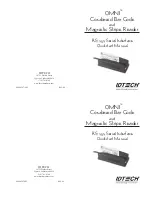
Glossary - 4
Symbol MiniScan MSXX04 Series Integration Guide
Data Matrix.
This error correcting, 2-dimensional matrix symbology was originally developed in 1989, and a finalized design
was completed in 1995 by International Data Matrix. It's capable of encoding various character sets including strictly
numeric data, alphanumeric data and all ISO 646 (ASCII) characters, as well as special character sets. The symbology
has both error detection and error correction features. Each Data Matrix symbol consists of data regions, which contain
nominally square modules set out in a regular array. A dark module is a binary 1 and a light module is a binary 0. There
is no specified minimum or maximum for the X or Y dimension. The data region is surrounded by a finder pattern, a
perimeter to the data region that is 1 module wide, which is surrounded by a quiet zone on all four sides of the symbol.
Two adjacent sides are solid dark lines used primarily to define physical size, orientation and symbol distortion. The two
opposite sides consist of alternating dark and light modules. These are used primarily to define the cell structure but also
assist in determining physical size and distortion. There are 2 types of Data Matrix symbologies: ECC 000 - 140 with
several available levels of convolutional error correction, and ECC 200, which uses Reed-Solomon error correction. For
ISO/IEC JTC 1/SC 31 purposes, only ECC 200 is recommended. The intellectual property rights associated with Data
Matrix have been committed to the public domain.
Data Structure.
The stipulation of the type of information that is included in a bar code, such as its order and format.
Dead Zone.
An area within a scanner's field of view, in which specular reflection may prevent a successful decode.
Decode.
To recognize a bar code symbology (e.g., UPC/EAN) and then analyze the content of the specific bar code
scanned.
Decode Algorithm.
A decoding scheme that converts pulse widths into data representation of the letters or numbers
encoded within a bar code symbol.
Decoder.
An electronic package that receives the signals from the scanning function, performs the algorithm to interpret the
signals into meaningful data and provides the interface to other devices.
Decryption.
Decryption is the decoding and unscrambling of received encrypted data. Also see,
Encryption
and
Key
.
Depth of Field.
The range between minimum and maximum distances at which a scanner can read a symbol with a certain
minimum element width.
Diffuse Reflection.
The component of reflected light that emanates in all directions from the reflecting surface.
Discrete 2 of 5.
A binary bar code symbology representing each character by a group of five bars, two of which are wide.
The location of wide bars in the group determines which character is encoded; spaces are insignificant. Only numeric
characters (0 to 9) and START/STOP characters may be encoded.
Discrete Code.
A bar code or symbol in which the spaces between characters (intercharacter gaps) are not part of the code.
DRAM.
Dynamic random access memory.
E
EAN.
European Article Number. This European/International version of the UPC provides its own coding format and
symbology standards. Element dimensions are specified metrically. EAN is used primarily in retail.
EAN/UPC.
A fixed-length, numeric 13-digit bar code symbol consisting of 30 dark elements and 29 intervening light
elements. Each character is represented by 2 bars and 2 spaces over 7 modules. A bar may be comprised of 1, 2, 3 or
4 modules. Each EAN/U.P.C. symbol consists of a leading quiet zone, a start pattern, 7 left-hand data characters, a
center bar pattern, 5 right-hand data characters, a Modulo 10 check character, a stop pattern and a trailing quiet zone.
Summary of Contents for MiniScan MS1204FZY
Page 1: ...Symbol MiniScan MSXX04 Series Integration Guide...
Page 2: ......
Page 3: ...Symbol MiniScan MSXX04 Series Integration Guide 72E 67134 05 Revision A January 2008...
Page 6: ...iv Symbol MiniScan MSXX04 Series Integration Guide...
Page 14: ...xii Symbol MiniScan MSXX04 Series Integration Guide...
Page 18: ...xvi Symbol MiniScan MSXX04 Series Integration Guide...
Page 24: ...1 6 Symbol MiniScan MSXX04 Series Integration Guide...
Page 42: ...2 18 Symbol MiniScan MSXX04 Series Integration Guide...
Page 50: ...3 8 Symbol MiniScan MSXX04 Series Integration Guide...
Page 70: ...5 12 Symbol MiniScan MSXX04 Series Integration Guide...
Page 82: ...6 12 Symbol MiniScan MSXX04 Series Integration Guide...
Page 94: ...7 12 Symbol MiniScan MSXX04 Series Integration Guide...
Page 106: ...9 4 Symbol MiniScan MSXX04 Series Integration Guide...
Page 218: ...10 112Symbol MiniScan MSXX04 Series Integration Guide Numeric Bar Codes continued 5 6 7 8 9...
Page 220: ...10 114Symbol MiniScan MSXX04 Series Integration Guide...
Page 240: ...A 16 Symbol MiniScan MSXX04 Series Integration Guide...
Page 252: ...Glossary 12 Symbol MiniScan MSXX04 Series Integration Guide...
Page 258: ......
Page 259: ......
















































